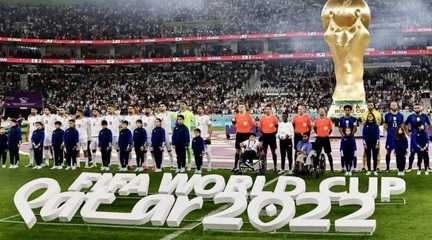
by Rashad Abu Dawood
I am not a football fan, but I have been watching the FIFA World Cup in Qatar with extreme joy, unmatched by anything else in this sad time for the Arab world. While others watched skilful players and teams, I watched history happening before our eyes at the first such global tournament to be held in an Arab and Muslim country.
For the first time, an Arab country is playing it right, and is scoring metaphorical goals against those who portray us as terrorists, backwards, saboteurs, criminals and killers. The organisation of the World Cup by Qatar is as near perfect as it can get; everything was prepared, and the technology is being utilised. The whole world is present, either in person or via social and mainstream media; often both. The most prominent, however, have been Islam and Palestine: 1-0 to Muslim Qatar.
Other goals followed. Those who wanted to attend were told to respect the culture and traditions of the Arab and Muslim host country. So no alcohol in the stadiums, no racism and no overt homosexuality.
All of this was done in a gentle and civilised manner. When some of the attendees protested that there was no beer in the stadiums, Qatar said that it was not stopping anyone from drinking outside the stadiums. The restriction, said the Qataris, was not unusual or exceptional; most countries do the same. When the Mexican fans protested and wanted Mexican beer, they were told there is only one kind, and when you go back to Mexico, you can do and drink whatever you please.
READ: Qatar slams European Parliament over human rights allegations
As for the racists who arrived dressed as medieval Crusaders to let the Arab Muslims know that, "We have returned," well, they were simply not allowed to enter the stadium. If they wanted to imitate the French general who occupied Damascus during World War One, placed his foot on the grave of Saladin, who liberated Jerusalem from the Crusaders, and said "Wake up Saladin, we have returned," they failed.
The immoral British woman who flashed her chest to the cameras when England defeated Iran, she was deported, and rightly so. The Qatar authorities made it clear what will happen to those who act in defiance of the Arab and Muslim identity of the host country, as well as its values.
The Germans have arguably been the most scandalous so far. They promoted the LGBTQ cause both on and off the pitch. German Foreign Minister sneaked into a stadium like a thief in the night to watch the German team play, and when she removed her red jacket it was seen that she was wearing a "One Love" armband. For a diplomat to break Qatari law so openly was unacceptable. The captains of the English, Welsh, Belgian, Dutch, Swiss, German and Danish teams had planned to wear the same armband during their matches, but backed down at the last minute in the face of a FIFA threat that they would be shown a yellow card the minute that they stepped onto the pitch. Instead, the German players gathered in traditional team photo formation, and placed their hands on their mouths in protest at Qatar refusing to support the LGBTQ community.
Who are the outcasts in Qatar? The Israelis. It was laughable to see the responses that Israeli journalists got as they were broadcasting live and their presence at the tournament and in occupied Palestine was roundly rejected by the Arab fans who they tried to speak to. When one fan discovered that the journalist was from Israel, he walked away and said, "You mean Palestine. There is no Israel."
"After ten days in Doha, we feel we are hated here, we are unwanted in the streets," said a Yedioth Ahronoth newspaper correspondent. "The Palestinians, Jordanians, Saudis, Iranians, Qataris, Moroccans, Syrians, Egyptians, Lebanese and Tunisians follow us and wave the Palestinian flag, chanting, 'Leave, leave, Israeli, leave'."
Indeed, the social media response to the Israeli presence in Qatar prompted one of the correspondents to say, "Netanyahu lied to us when he said we recently normalised relations with four Arab countries and we have diplomatic ties with four others. We are certain that we are rejected by all of the Arab nations."
To this I say: you will never be accepted.
This content was published in Middle East Monitor on November 30, 2022. To restrict the overall size; some images may have been excluded.
Opinions expressed in this article are the author's own and do not necessarily reflect the views of UMMnews.




